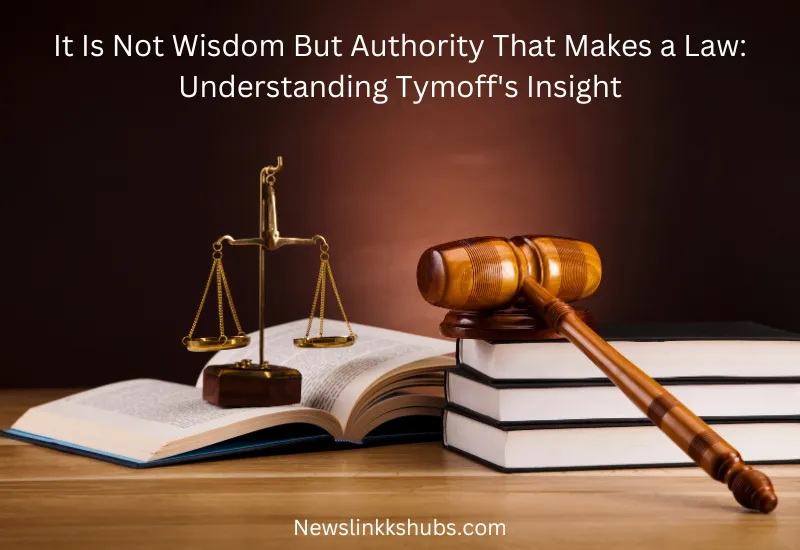It is Not Wisdom but Authority that Makes a Law. T – Tymoff

The statement “It is not wisdom but authority that makes a law” underscores that laws stem from power rather than intellect. Tymoff delves into the predominance of authority in legal creation, eclipsing the sagacity of lawmakers.
The foundation of law is paramount in societies governed by rules and regulations. Tymoff’s aphorism illuminates the underlying power dynamics in legislative systems, highlighting that irrespective of a law’s wisdom or moral value, it is the authoritative power behind its creation that enforces it.
This perspective compels readers to reassess the nature of legal systems, questioning whether they are founded on pillars of justice and knowledge or merely on the might of those who dominate the legislative process. It serves as a poignant reminder that the essence of law often rests not in the Enlightenment of its crafters but in their capacity to impose their will.
Contents
- 1 The Essence Of Lawmaking
- 2 Historical Perspectives On Authority In Law
- 3 Authority In Contemporary Legal Systems
- 4 Wisdom In Law: The Ideal Vs. Reality
- 5 The Interplay Of Wisdom And Authority
- 6 Case Studies: Authority Over Wisdom
- 7 The Consequences Of Authority-based Laws
- 8 Rethinking Lawmaking: Integrating Wisdom And Authority
- 9 Conclusion
- 10 Frequently Asked Questions
- 10.1 What Defines Legal Authority?
- 10.2 How Does Authority Differ From Wisdom?
- 10.3 Can Laws Exist Without Authority?
- 10.4 Is Authority Always Just In Lawmaking?
- 10.5 What Role Does Wisdom Play In Law?
- 10.6 How Does Public Perception Affect Law’s Authority?
- 10.7 Can Authority Be Challenged In A Legal System?
- 10.8 What Is The Source Of A Law’s Authority?
- 10.9 Do All Cultures View Legal Authority Similarly?
- 10.10 How Is Authority Established In New Laws?
The Essence Of Lawmaking
The Essence of Lawmaking is a complex process. It shapes society. Laws guide behaviour, enforce order, and protect freedoms. But what truly powers lawmaking? Is it wisdom or authority? Let’s dive deep into this intriguing aspect.
The Role Of Authority
Authority stands at the heart of lawmaking. It gives power. This power lets entities create laws. These entities could be governments or legislative bodies. Without authority, laws lack enforcement power. They become mere suggestions.
- Authority ensures compliance: People follow laws because they must.
- It establishes legitimacy: Authority gives laws their legitimacy.
- Maintains order: Through authority, laws maintain societal order.
Wisdom Vs. Authority In Legal Systems
While wisdom aspires to justice and fairness, authority focuses on enforcement and control. Both are essential, yet they fulfil different roles:
| Aspect | Wisdom | Authority |
| Focus | Justice | Control |
| Role | Guides law creation | Enforces laws |
| Outcome | Fairness | Order |
Essentially, authority activates laws, and wisdom shapes them for the greater good. Together, they are the backbone of effective legal systems, ensuring that laws exist, promote justice, and maintain order.
Historical Perspectives On Authority In Law
When exploring the roots of legal systems, authority stands out. It shapes laws throughout history. Let’s dive into the past and see how authority influenced law.
Ancient Civilizations And Legal Authority
Ancient societies built the foundations of legal authority. They set the stage for modern law.
- Code of Hammurabi: One of the oldest known law codes. Authority came from the Babylonian king.
- Egyptian Pharaohs: Seen as gods, they wielded absolute legal power.
- Roman Law: Roman Emperors had the final say in creating laws.
These civilizations show how rulers personified law.
Enlightenment Thinkers On Authority And Law
The Enlightenment sparked new ideas about law and authority. Thinkers questioned the source of legal power.
| Thinker | Views on Authority |
| John Locke | The law should protect individual rights, with authority from the people. |
| Montesquieu | Separation of powers limits authority and promotes fair laws. |
| Rousseau | Authority lies in the general will, aiming for the common good. |
These thinkers influenced how we view authority in law today.
Authority In Contemporary Legal Systems
In the vast ocean of laws that govern us, authority reigns supreme. It’s not just about wisdom or moral compass; it’s the might of authority that breathes life into the laws that rule our everyday existence. This authority shapes the very framework of contemporary legal systems around the world. It’s a complex hierarchy where power is carefully distributed and regulated. Let’s explore the pillars of this system: the judicial hierarchy and legislative power.
Judicial Hierarchy And Its Power
The judicial system operates like a pyramid. At the top are the highest courts, which set precedents for others to follow. These apex courts hold the ultimate authority in interpreting laws and often have the last word in legal disputes.
Various courts lower in the hierarchy handle different cases. Each level must respect the decisions made by the courts above it. This structure ensures consistency and order in the application of law.
Legislative Authority And Its Limits
While judges interpret laws, legislators craft them. Elected bodies like parliaments and congresses wield the power to create laws. These institutions reflect the people’s will, translating public interest into legal statutes.
Yet, this power is not absolute. Legislatures must operate within the boundaries of a constitution or higher law. They face limits, such as checks and balances, and must ensure laws are fair and just. The legislative process involves multiple stages of debate and amendment, allowing for transparency and public scrutiny.
Wisdom In Law: The Ideal Vs. Reality
Wisdom in Law: The Ideal vs. Reality explores the gap between the philosophical ideals of justice and the practical application of laws. This complex interplay shapes societies, influencing both the rule of law and the lives of citizens. As we delve into this topic, we consider the age-old question: does wisdom truly govern the laws we follow, or does authority reign supreme?
Philosophical Notions Of Wise Lawmaking
Philosophers have long debated the essence of wise lawmaking. From Plato’s philosopher-kings to Aristotle’s emphasis on virtue, the ideal suggests laws should stem from wisdom. This wisdom ensures fairness, justice, and the common good. The following points highlight critical aspects of this philosophical approach:
- Justice over interest: Wise laws prioritize the greater good over individual desires.
- Reason over force: Reason and logic form the basis of laws, not the power of rulers.
- Moral integrity: Lawmakers should possess a solid ethical compass guiding their decisions.
Practical Challenges To Wise Governance
In reality, governance practice must often catch up to these philosophical ideals. Various factors contribute to this divergence:
| Challenge | Impact on Lawmaking |
| Political Pressure | Laws may favour certain groups under political influence. |
| Resource Constraints | More resources are needed to allow for the scope of just laws. |
| Public Opinion | Popular demand can sway laws, regardless of wisdom. |
Despite these challenges, pursuing wisdom in law remains a noble and essential goal. It is the bridge between the authority that enforces laws and the higher wisdom that should guide them. Recognizing and striving to close the gap between the ideal and reality is a step towards a more just society.
The Interplay Of Wisdom And Authority
Exploring the delicate dance between wisdom and authority reveals much. Laws shape societies. Yet, their creation is sometimes about something other than the wisest choice. Sometimes, it’s about who holds power. Wisdom and authority often clash in this realm.
Balancing Act In Democratic Societies
In democratic systems, a balance must exist. People’s wisdom influences those in power. Leaders create laws. But they should also listen. This balance keeps societies fair and just. It is a challenging but vital task.
- Citizens’ input guides lawmakers.
- Leaders must be accountable and transparent.
- Checks and balances prevent abuse of power.
When Authority Overrules Wisdom
Sometimes, those in power ignore wise counsel. Authority can push aside wisdom, leading to laws that don’t serve the public good. Recognizing these moments is critical. It prompts citizens to take action and demand change.
| Authority’s Impact | Wisdom’s Role |
| Enforces laws | Shapes ethical guidelines |
| May limit freedoms | Seeks balance and justice |
| Can be rigid | Promotes adaptability |
Case Studies: Authority Over Wisdom
The topic Case Studies: Authority Over Wisdom dives deep. It explores how, sometimes, laws come from authority, not wisdom. This means influential people decide, not the smartest or most thoughtful. Let’s see examples from the past and today.
Historic Legislation Without Wisdom
History shows us many laws that lacked wisdom. These laws reflected the power of those in charge, not the people’s best interests. Here are a few:
- Prohibition in the USA (1920-1933): This meant to improve society but led to increased crime instead.
- The Witch Trials: Fear, not facts, led to innocent people’s deaths.
- Feudal Laws: Kept the poor poor and the rich powerful.
Modern Examples Of Authority-driven Laws
In recent times, we still see laws that ignore common sense. These examples show the authority’s role:
| Law | Location | Issue |
| Internet Censorship | Various Countries | Limits free speech |
| Anti-Homeless Legislation | Urban Areas Globally | Penalizes poverty |
| Strict Dress Codes | Schools Worldwide | Restricts personal expression |
These cases show how power, not wisdom, often shapes our world. They remind us to question and think critically about laws and their origins.
The Consequences Of Authority-based Laws
Laws shape our society. Sometimes, they come from authority, not wisdom. This raises questions. What happens when laws reflect power, not fairness? Let’s explore the consequences of authority-based laws.
Impact On Justice And Equality
Authority-driven laws can skew justice. They might treat everyone differently. Here are some impacts:
- Biased outcomes: People in power could get favourable treatment.
- Suppressed voices: Minority groups might not be heard fairly.
- Unequal opportunities: Laws could favour certain groups over others.
Long-term Societal Effects
Laws based on authority can shape societies in lasting ways:
| Aspect | Effect |
| Trust in Institutions | It may decrease if laws seem unfair. |
| Social Cohesion | It could weaken due to unequal treatment. |
| Progress | It may stall if innovation is not nurtured. |
Rethinking Lawmaking: Integrating Wisdom And Authority
In a world where laws shape societies, a question arises. Is authority alone enough for lawmaking? The quote by Tymoff, “It is Not Wisdom But Authority That Makes a Law,” pushes us to think. Can wisdom play a more significant role in creating laws? Let’s explore how lawmaking can evolve with both wisdom and authority.
Proposals For Reform
Lawmaking needs balance. The authority sets rules, but wisdom ensures fairness. Reforms can bridge this gap. Here are vital proposals:
- Expert Committees: Include subject matter experts in drafting laws.
- Impact Assessments: Evaluate the potential outcomes of laws.
- Public Consultations: Gather diverse opinions before finalizing laws.
These steps can blend authority’s power with wisdom’s insight.
The Role Of Public Discourse And Education
Public discourse and education are pillars of democracy. They shape informed citizens. Here’s their role in lawmaking:
- Encouraging Debates: Debates promote understanding of laws.
- Education Programs: Teach legal processes in schools and communities.
- Media Engagement: Use media to spread awareness about laws.
Together, they empower people to contribute to wise laws.
Conclusion
The discourse sparked by Tymoff’s statement, “It is Not Wisdom But Authority That Makes a Law,” compels us to evaluate the laws that govern us critically. We can strive towards a legal framework that embodies justice and equity by advocating for a balanced integration of wisdom and authority.
Frequently Asked Questions
What Defines Legal Authority?
Legal authority is the sanctioned power granted to individuals or institutions to create, enforce, or interpret laws within a jurisdiction.
How Does Authority Differ From Wisdom?
Authority is the right to command or enforce laws, while wisdom is the insightful understanding and judgment regarding life and situations.
Can Laws Exist Without Authority?
No, laws require authority for their creation, enforcement, and recognition within a society to be compelling and legitimate.
Is Authority Always Just In Lawmaking?
Only sometimes can authority be misused, leading to unjust laws that do not necessarily reflect wisdom or ethical principles.
What Role Does Wisdom Play In Law?
Wisdom guides lawmakers in creating just and ethical laws that consider the well-being and rights of individuals and society.
How Does Public Perception Affect Law’s Authority?
Public perception can legitimize or delegitimize a law’s authority, influencing its acceptance and adherence among the populace.
Can Authority Be Challenged In A Legal System?
Yes, legal systems often have mechanisms for challenging authority, such as judicial review or appeals, to ensure fairness and justice.
What Is The Source Of A Law’s Authority?
A law’s authority typically stems from a constitution, governing body, or sovereign power recognized by the people it governs.
Do All Cultures View Legal Authority Similarly?
Cultural differences can lead to varying perceptions of legal authority, with some societies emphasizing collective rights and others individual liberties.
How Is Authority Established In New Laws?
Authority in new laws is established through legislative processes, democratic voting, or executive orders, depending on the governing system.
Read:


